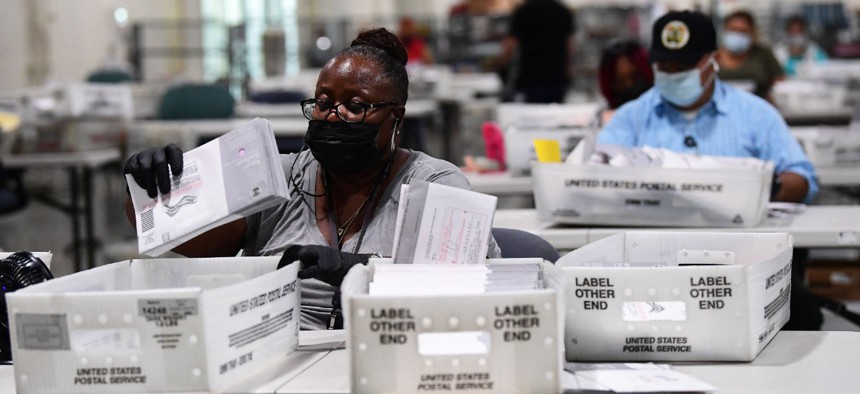
FREDERIC J. BROWN/AFP via Getty Images
The White House Wants to Give USPS $5 Billion to Boost Mail-In Voting
The Postal Service faced criticism for its election efforts in 2020, but ultimately was largely successful in delivering ballots.
The Biden administration wants to give the U.S. Postal Service $5 billion to improve its capacity to deliver ballots and other election mail, saying it would help support free and fair elections.
The White House’s proposal would provide $500 million per year for 10 years and would require that all ballots and related materials are free to mail. It would also reduce the cost of other election-related mail for jurisdictions and voters and enhance services in underserved areas. The funding request comes after postal management faced significant outcry and litigation over its efforts in the runup to the 2020 election.
“This proposal expands on the essential public services that the Postal Service provides to the American people and will also help to relieve budget strain on local election offices across the country,” the White House said.
After Postmaster General Louis DeJoy sought to slash late and extra mail trips shortly after taking office in 2020, a series of lawsuits led to court orders requiring USPS to pause that policy and inform employees it was no longer operative. Federal courts required USPS to perform those trips “to the maximum extent necessary to increase on-time mail deliveries, particularly for election mail.” The lawsuits also led to a pause on longstanding efforts to decommission mail processing equipment and remove blue collection boxes.
In the final stretch before the 2020 election, USPS committed a slew of additional resources specifically aimed at moving ballots, including increased overtime, additional trips, expediting election mail for delivery and new processes each day to flag the specially marked mail. The mailing agency began conducting sweeps to check for political advertising mail, voter registration documents and absentee voting requests in January 2020, and sent postal inspectors to all processing plants that handle election mail beginning in late October.
As part of a settlement agreement with the NAACP and Public Citizen last year, USPS pledged to make a “good-faith effort” to set election plans through at least 2028 similar to those in place in 2020. Management will “prioritize monitoring and timely delivery of election mail,” though the agency and the plaintiffs agreed it was premature to get into specifics. Ultimately, the Postal Service was largely successful in ensuring on-time delivery of election mail last year.
Ahead of the 2020 election, DeJoy promised to prioritize election mail for delivery even if states and boards of elections used a cheaper designation to deliver ballots. State officials and federal lawmakers had raised concerns that USPS would no longer treat ballots as First-Class mail even if they were sent using marketing mail, which has a slower delivery window. While the details must still be sorted out, the Biden administration's proposal to make all ballots free to mail could negate that distinction and make it easier for the Postal Service to permanently expedite ballot delivery. Some jurisdictions provide prepaid return envelopes to voters when sending out mail-in ballots, but some do not.
The White House said the proposal's authorization would require separate legislation.
Under its settlement agreement, USPS will post all of its national guidance documents for election mail on its website for 2022, 2024, 2026 and 2028. Postal management will meet with the NAACP at least twice per election year and provide performance data in the run up to the election. The plaintiffs can file a motion before the U.S. District Court for the District of Columbia that heard the case if USPS violates any of the terms of the settlement.
The NAACP expressed confidence that with its new ability to monitor USPS performance during elections, it would be able to "ensure that the right to vote is protected for all citizens." The Postal Service, for its part, said the litigation was unnecessary and it would have “performed admirably” during the election period without it.
Dave Partenheimer, a USPS spokesman, said the mailing agency is committed to timely delivery of election mail and it is up to lawmakers to determine its exact role.
“We look forward to learning what other details Congress might put forward in legislation in response to this budget proposal,” Partenheimer said. “The Postal Service is committed to fulfilling our role in the electoral process and supporting election officials that choose to utilize us as a part of their election system.”







